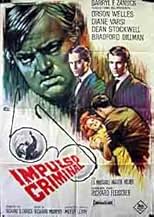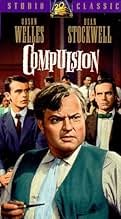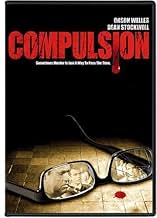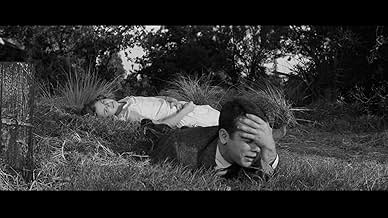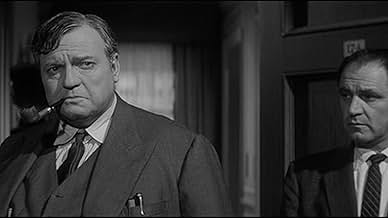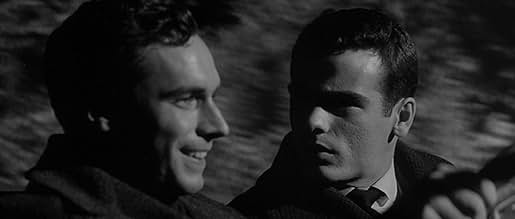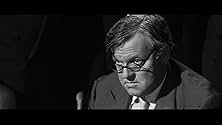NOTE IMDb
7,4/10
8,2 k
MA NOTE
Deux riches étudiants en droit sont jugés pour meurtre dans cette version de l'affaire Leopold-Loeb.Deux riches étudiants en droit sont jugés pour meurtre dans cette version de l'affaire Leopold-Loeb.Deux riches étudiants en droit sont jugés pour meurtre dans cette version de l'affaire Leopold-Loeb.
- Réalisation
- Scénario
- Casting principal
- Nomination aux 1 BAFTA Award
- 1 victoire et 5 nominations au total
Robert F. Simon
- Police Lt. Johnson
- (as Robert Simon)
John Alban
- Reporter
- (non crédité)
Don Anderson
- Reporter
- (non crédité)
Brandon Beach
- Courtroom Spectator
- (non crédité)
Terry Becker
- Benson - The Angry Reporter
- (non crédité)
Russ Bender
- Edgar Llewellyn - Attorney
- (non crédité)
Avis à la une
The real-life Leopold-Loeb murder case, which inspired Alfred Hitchcock's "Rope," among other films, is the basis for this story of a couple of rich young men committing a murder just for the thrill of trying to pull off the perfect crime. Stockwell and Dillman are well cast as the cold-blooded killers. The first half of the film, focusing on the strange relationship between the two men, their crime, and their arrest, is quite interesting. Then Welles shows up as the defense attorney and the film loses momentum. Welles seems to be sleep-walking through this one, and his final speech seems to take up about a third of the film.
Seeing "Compulsion" again after a very long time, it amazed me how well I remembered it. In fact I remembered every tiny little turn in Dean Stockwell's eyes. He is superb in the part of the young semi genius with a weakness for the shallow Bradford Dillman. The Leopold and Loeb case was the base for this thrilling Richard Fleischer film. It won acting awards for Stockwell, Dillman and Orson Welles at the Cannes Film Festival but with the benefit of hindsight, Dean Stockwell emerges as the winner against the famous test of time. Dillman seems a little bit too everything. Welles is great fun to watch and E G Marshall is terrific as the man determined to unmask the "powder poofs". Stockwell fainting at the trial, something that could have been so over the top, is in fact, shattering. The Leopold and Loeb story was also the base for Hitchcock's "Rope" and the wonderful Tom Kalin's "Swoon" Another version was rumored in 1991, directed by Martin Donovan with River Phoenix in the Stockwell part.
If "Compulsion" is still such a powerful film is, totally, Dean Stockwell's merit. What a sensational actor! I'm writing this the day after the announcement of Dennis Hopper's death and while I was looking for a Dennis Hopper movie to watch a came across "Compulsion" Not Hopper but Stockwell and I settled for that anyway. I was riveted by Stockwell's performance because everyone else (with the natural exception of Orson Wells and E G Marshall) seems so dated and acted that Dean's every moment is sheer magic. He doesn't shy away from the awfulness but makes his young monster totally human, provoking in us that element that Orson Welles's closing argument tries to bring to the forefront. If you love great acting, you can't afford to miss Dean Stockwell in "Compulsion"
We can add Welles to Wilde, Monroe and others who we never respected until they were gone. His pleading for the lives of those crazy boys (as Clarence Darrow did) is an eloquent plea for the ending of the death penalty. Funny, how a barometer like the death penalty tells us so much about a society's relative civility. The US had backed away from it, but is now swinging back toward even public executions (which I would much prefer, as they show all of us how barbaric we have become).
Note that the movie dwells on their 'craziness' and 'richness', not the Jewishness or the homosexual relationships that evoked the wrath of the public in the real case. Both Dillman and Dean Stockwell do an excellent job of drawing out your anger until you find yourself one of the mob yelling for blood. To stem the tide, in comes Orson Welles. Welles' phrasing and meaningful looks struck me again with what a magnificent actor he was, as well as director.
Now I have to go read 'Compulsion', the novel around which this movie was made, to determine what was left out and if it would have contributed to some of the obviously omitted details that make this movie a little choppy. This movie performs the task that great art must take on itself: to provide us insights into life and how it should be lived. That can be done either negatively or positively, by point or counter-point.
Of course, unless you had some excellent writers and actors of the stature of Welles, you wouldn't come up to the quality of this movie. Definitely, black and white contributed to the brooding quality of the film. Color would have detracted, and you'll seldom 'hear' me say this.
Note that the movie dwells on their 'craziness' and 'richness', not the Jewishness or the homosexual relationships that evoked the wrath of the public in the real case. Both Dillman and Dean Stockwell do an excellent job of drawing out your anger until you find yourself one of the mob yelling for blood. To stem the tide, in comes Orson Welles. Welles' phrasing and meaningful looks struck me again with what a magnificent actor he was, as well as director.
Now I have to go read 'Compulsion', the novel around which this movie was made, to determine what was left out and if it would have contributed to some of the obviously omitted details that make this movie a little choppy. This movie performs the task that great art must take on itself: to provide us insights into life and how it should be lived. That can be done either negatively or positively, by point or counter-point.
Of course, unless you had some excellent writers and actors of the stature of Welles, you wouldn't come up to the quality of this movie. Definitely, black and white contributed to the brooding quality of the film. Color would have detracted, and you'll seldom 'hear' me say this.
I don't know why I'm so attracted to this vulnerable weirdos. From Anthony Perkins as Norman Bates in Psycho to Colin Firth as Adrian Leduc in Apartment Zero, darkness and a fragility that is part of the unbearable suspense. Maybe I'm in need of professional attention but I don't think so. What attracts me is by the undeniable innocence behind the horror and that has a lot, if not everything, to do with the actors playing them. Look at Anthony Perkins in Psycho! 57 years ago and it still looks and feels kind of revolutionary or Colin Firth in Apartment Zero, the character is so unique and real that you can see it a thousand times and always find some new extra something, then Dean Stockwell in Compulsion. He plays a monster, a sick, pathetic prince of a man. Yes all of that. The humanity of the actor makes the monster human and we can't dismiss him, he doesn't allow us. Orson Welles has a great entrance into the film and E.G Marshall is superb as per usual, it is the rest of the cast who seem a bit dated, specially when sharing the frame with the extraordinary Dean Stockwell
Le saviez-vous
- AnecdotesAlthough the story was a thinly-disguised recreation of the Nathan Leopold and Richard Loeb murder case, the legal department of 20th Century Fox was still concerned about a possible lawsuit from the still-living Leopold. A great effort was made not to mention Leopold or Loeb in the movie, press releases, and interviews. However, there was apparently poor communication with the advertising department, since when the movie came out, newspaper ads stated, "based on the famous Leopold and Loeb murder case." Leopold sued the filmmakers. He did not claim libel, slander, nor anything false nor defamatory about the film. Instead, he claimed an invasion of privacy. The court rejected his claim, in part, because Leopold had already published his own autobiography "Life Plus 99 Years," presenting essentially the same facts.
- GaffesWhen the murdered boy is in the morgue, his uncle recognizes him instantly, and the coroner doesn't mention to the young journalist (who found the glasses) that the kid had acid burned all over his face so he couldn't be identified. In the real life case, his face was burned and, most importantly, at the very end of the movie, Orson Welles as the defending attorney mentions that the murdered boy's face was burned with acid.
- Citations
Jonathan Wilk: If there is any way of destroying hatred and all that goes with it, it's not through evil and hatred and cruelty, but through charity, love, understanding.
- Crédits fousOpening credits prologue: CHICAGO, 1924
- ConnexionsFeatured in The Paper Chase: Commitments (1983)
Meilleurs choix
Connectez-vous pour évaluer et suivre la liste de favoris afin de recevoir des recommandations personnalisées
- How long is Compulsion?Alimenté par Alexa
- Is 'Compulsion' based on a book?
- How closely does this movie follow the real story about Leopold and Loeb?
- Who represents Leopold and who represents Loeb in the movie?
Détails
- Durée1 heure 43 minutes
- Couleur
- Rapport de forme
- 2.35 : 1
Contribuer à cette page
Suggérer une modification ou ajouter du contenu manquant

Lacune principale
By what name was Le génie du mal (1959) officially released in India in English?
Répondre

